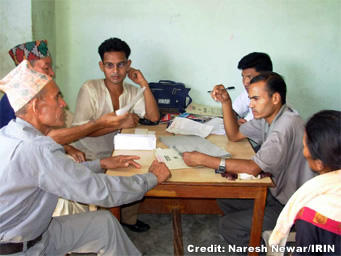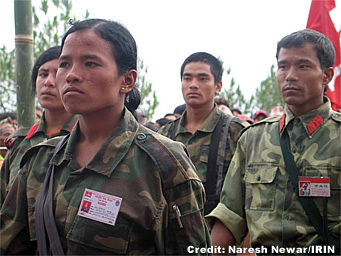|
Nepal
in Crisis 2006: Facts
|
|
Rebels
accused of running parallel government
|
 |
NEPALGANJ,
14 Sep 2006 (IRIN)
Maoist
leader Purna Subedi is regarded by local residents as the most powerful
person in Nepalganj, Nepal's key border city, which lies 600 km west of
the capital, Kathmandu.
As
the chief of the 'People's Government' of Banke district, where Nepalganj
is the headquarters, Subedi has the power to shut down businesses, close
down schools and colleges, has the authority to allow or prohibit the building
of roads and bridges, and can cripple life easily in the city by marching
her rebels on the streets to forcefully organise strikes, according to
local residents.
She
has her own economic policy to randomly levy taxation on businesses and
individuals in whatever way her Maoist cadres desire.
 |
| <<
A rebel 'People's Court' in session. These controversial bodies still dispense
justice in areas under rebel control. Despite calls to shut the courts
down, the rebels have turned a deaf ear.
"The
Maoists are already acting as if they are the chosen government to rule
over us," explained a local trader, requesting anonymity.
After
waging a decade-long armed rebellion against the Nepalese state, the Maoists
have since April been observing a mutual ceasefire with the new interim
government of seven national parties following an end of the absolute rule
of the Nepalese monarch, King Gyanendra, after a nationwide uprising against
him. |
|
"It
is very unethical on the part of the Maoists, who have turned a deaf ear
to both the parties and the government when requested to stop collecting
taxes, or making their own policies, especially in the villages," said
Krishna Man Shrestha, leader of the Nepali Congress (NC), the largest national
party.
However,
the Maoist leaders have told IRIN in Nepalganj that they have the right
to govern as they control nearly three-quarters of the Himalayan kingdom.
"We are the parallel government and will not stop acting as such," explained
the rebel leader Subedi.
The
Maoists are finding it easy to collect taxes from vegetable and livestock
markets, forestry, transportation, hotels, schools, colleges, and individuals,
and even collect customs duties near the Nepal-India border, according
to observers.
top
 |
| <<
PLA fighters
"We
control all the borders in west Nepal and the people bringing in supplies
from India pay tax to us and not the interim government," said rebel leader
Sunil in Bardiya district, 100 km west of Nepalganj.
Sunil's
Maoist office also controls the big contract agreements to build roads
and bridges. "We are the ones who own most of the villages, so the people
have to accept our Maoist government," he explained and added that even
the fishermen and the boatmen in the Babai and Rapti rivers had to get
permission for leases from them rather than from the seven-party government. |
|
Another
key concern among the parties and human rights activists has been Maoist
attempts to interfere into the country's judiciary system by running their
own 'People's Courts,' to help to find justice for people who lost their
cases in the real courts.
"As
a political force, we have to be involved in every sector and so we have
our own legal system, vastly different from the usual court system of this
country," said Anil Chettri, who is the chief judge of the 'People's Court'
in Kohalpur village, 50 km from Nepalganj. Chettri did not attend university
and has no formal training in law, although he says he has enough practical
experience.
But
there are concerns that this judge has often ruled in favour of his own
Maoist supporters despite lack of strong evidence against their opponents.
"You
have to be a Maoist supporter to win the case. The innocent people who
are not supporting their rebellion will be victimised," said a landowner
requesting anonymity as he was leaving the Maoist court after losing his
case over a land dispute with a rebel farmer. He explained that many people
have lost their lands to farmers backed by the Maoists after filing cases
in the rebel court.
Last
month, the rebel chief Prachanda had ordered all his cadres to close down
the courts in the core city areas following heavy protests from both the
parties and rights activists. But the courts are still being run in most
of the urban and rural areas, said the party leaders.
"The
Maoists have to realise that they are not yet a government. They have to
act like a political party and stop posing as a parallel to the interim
government if they are really serious about making the peace process a
success," said Bhar.
top
Credit
IRIN 2006
Copyright
© UN Office for the Coordination of Humanitarian Affairs 2006
[
This report does not necessarily reflect the views of the United Nations]
Integrated
Regional Information Networks (IRIN), part of the UN Office for the Coordination
of Humanitarian Affairs (OCHA).

|





